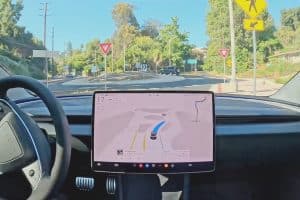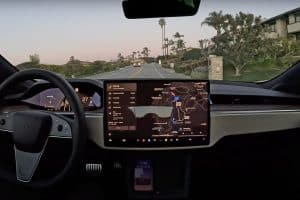- 🚗 Tesla preparing to register Full Self-Driving (FSD) in China.
- 📝 Efforts to register FSD with China’s Ministry of Industry and Information Technology are underway.
- 📅 Targeting a rollout for the advanced driver-assist system within this year.
- 💼 Considering a subscription-based model for FSD in China.
- 🚦 Basic Autopilot and Enhanced Autopilot currently available in China.
- 🔄 Enhanced Autopilot adds advanced features like Navigate on Autopilot and Auto Lane Change.
- 📍 FSD aims to offer Autopilot on City Streets, a significant upgrade.
- 🌟 FSD rollout could enhance Tesla’s market position in China’s competitive electric vehicle sector.
- 📉 Tesla’s domestic sales in China recently down by 3.3% year-over-year.
Tesla, the global electric vehicle (EV) powerhouse, is making a significant strategic move by preparing to register its Full Self-Driving (FSD) system in China. As reported by Reuters, this step is part of Tesla’s larger plan to roll out its advanced driver-assist technology in the country within this year. The move highlights Tesla’s ambition to enhance its market presence in China’s mature and competitive EV sector.
Current Autopilot Offerings in China
Basic Autopilot
Currently, Chinese Tesla customers have access to Basic Autopilot, which includes:
- Traffic-Aware Cruise Control
- Autosteer
Basic Autopilot comes as a standard feature with every Tesla model in China, providing essential driver assistance that enhances safety and convenience on the road.
Enhanced Autopilot
For a more advanced experience, Tesla offers Enhanced Autopilot for an additional RMB 32,000 ($4,400), which adds:
- Navigate on Autopilot
- Auto Lane Change
These features offer significant improvements in driving support, enabling more autonomous navigation and lane-switching capabilities on highways.
The Full Self-Driving (FSD) Leap
The introduction of FSD in China is anticipated to be a game-changer. Unlike the current Autopilot systems, FSD aims to provide:
- Autopilot on City Streets: Enabling vehicles to navigate complex urban environments autonomously.
This leap would bring Tesla’s technology to the forefront of the Chinese market, which is teeming with competitors that offer basic and enhanced driving assistance features but lack the comprehensive autonomy FSD promises.
Regulatory and Market Impacts
Registration Efforts
Tesla’s efforts to register FSD with the Ministry of Industry and Information Technology (MIIT) are crucial. Successfully navigating China’s regulatory landscape will allow Tesla to:
- Test FSD on Public Roads: Gaining invaluable real-world data.
- Roll Out FSD to Consumers: Potentially through a subscription-based model.
Market Position
Rolling out FSD could significantly bolster Tesla’s position in China by offering a distinctive feature that most competitors currently do not provide. This strategic initiative could help reverse Tesla’s recent 3.3% year-over-year decline in domestic sales as of late May 2024.
Subscription-Based Model: A Smart Move?
Tesla is considering a subscription-based model for FSD in China. This approach presents several advantages:
- Lower Barrier to Entry: Attracting customers who may balk at a one-time high payment.
- Steady Revenue Stream: Ensuring continuous revenue from subscribers.
Potential Challenges
While the prospects are promising, Tesla faces several challenges:
- Regulatory Hurdles: Navigating complex regulatory requirements in China.
- Consumer Trust: Gaining the confidence of Chinese consumers in the safety and reliability of FSD.
- Market Competition: Standing out in an already crowded market with strong local and international competitors.
Conclusion
Tesla’s move to register Full Self-Driving (FSD) in China is a bold strategic effort that could redefine the company’s market position in one of the world’s most competitive EV sectors. By navigating regulatory challenges and leveraging a subscription-based model, Tesla aims to set new standards in autonomous driving technology. The success of this initiative could pave the way for even greater technological advancements and market growth in the future.





